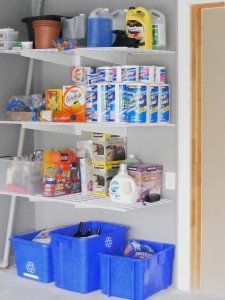Last time we talked about items that should never be stored in your garage. However, care must be exercised with another group of materials that often find a home in our garages—chemicals. Quick, think of all of the chemicals currently stored in your garage. There are probably household chemicals like cleaners; chemicals for the maintenance of your car, like anti-freeze and window washing fluid; and gardening chemicals, like pesticides and fertilizers. If you have a pool, you have a host of additional chemicals stored in your garage.
While all of the chemicals listed above are commonly found in garages, they can be the source of household accidents if not stored properly. Let’s consider a few precautions needed to protect your home and family when storing chemicals.
Keep Hazardous Chemicals Out of Reach
 Animals and small children are notoriously curious. This can serve a child well in many ways. However, a child or pet’s natural curiosity combined with improper storage of chemicals in a garage can turn deadly. Therefore, all chemicals should be stored well out of reach of children and pets. Consider not only a child’s height, but children’s propensity to climb. Make sure that chemicals aren’t easily accessible if the child climbs on a shelf or nearby crate. This is especially true of chemicals like window washing fluid and antifreeze which resemble colorful drinks.
Animals and small children are notoriously curious. This can serve a child well in many ways. However, a child or pet’s natural curiosity combined with improper storage of chemicals in a garage can turn deadly. Therefore, all chemicals should be stored well out of reach of children and pets. Consider not only a child’s height, but children’s propensity to climb. Make sure that chemicals aren’t easily accessible if the child climbs on a shelf or nearby crate. This is especially true of chemicals like window washing fluid and antifreeze which resemble colorful drinks.
Keep chemicals off of the ground and well out of reach of children and pets to ensure their safety and prevent accidental poisoning.
Store Chemicals in the Proper Containers
As a general rule, chemicals should always be stored in their original containers. However, there might be an occasion when you need to store a chemical in another container. For instance, you might borrow paint thinner from your next door neighbor. Rather than taking the entire container, you pour a few ounces in an old water bottle or some other discarded food container. When you’re done with the project, you store what’s left of the chemical on a shelf in your garage. Doing so could potentially lead to accidental poisoning if a child mistakes that paint thinner for what’s actually on the label.
Additionally, certain chemicals can only be stored in particular types of containers. For instance some chemicals will corrode a metal container or eat through a thin plastic one. Read the label and store the chemical according the manufacturer’s instructions.
Properly Label Chemicals
Let’s say that you stored a clear liquid chemical in a suitable jar or bottle, but didn’t bother to label it. Now it’s two years later. You’re looking for paint thinner and you happen across the unmarked container. You think it’s paint solvent, but you’re not sure. Maybe it’s something else altogether. While many household chemicals have fairly distinct smells, others do not. Besides, sniffing a noxious chemical isn’t the safest way to determine what it is. Labeling all of the chemicals stored in your garage ensures that you know exactly what you’re dealing with.
Invest in a Lockable Chemical Storage Cabinet
Earlier, we talked about keeping chemicals stored out of the reach of children and pets. A high shelf can work well, but a lockable storage cabinet works better. It doesn’t have to be huge, or take up valuable garage floor space. There are a variety of options available, from cabinets with a small footprint to those that can be installed on a wall.
Poisonous, highly-flammable chemicals are found in most homes and garages. They play a critical role in keeping our homes clean, our cars well-maintained and our gardens lush and green. However, to protect your home and family, you must safely store such chemicals. Keep household and other chemicals out of the reach of children and pets. Store chemicals in appropriate containers, preferably the container in which it came. If the label on the original container loosens, secure it with tape. If you must store the chemical in another container, ensure that it is properly labelled. If possible, invest in a lockable cabinet suitable for storing chemicals.
If the configuration of your garage, or the volume of items you currently have stored in it, makes it difficult for you to properly store chemicals, contact a garage organization specialist who can help.